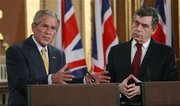
US President George W. Bushand British Prime Minister Gordon Brown (AP)
LONDON (AP) – Britain will freeze assets of Iran’s largest bank in a further move to discourage the country from developing nuclear weapons, Prime Minister Gordon Brown said Monday.
Brown, speaking at a news conference with President Bush, said Britain will work to persuade Europe to follow suit.
The British leader said that assets of Iran’s Bank Melli would be frozen. Last year, the United States accused the bank of providing services to Iran’s nuclear and ballistic missile programs.
“Action will start today in new phase of sanctions on oil and gas,” Brown said. “We will take any necessary action so that Iran is aware of the choice it needs to make.”
The U.S. and some of its allies accuse Iran of trying to develop nuclear weapons. Iran denies that, saying its atomic program is aimed at using nuclear reactors to generate electricity.
The U.N. Security Council has imposed three sets of limited sanctions against Iran for refusing to halt uranium enrichment, a technology that can both produce nuclear fuel and turn out the material needed for nuclear warheads.
The third round of U.N. sanctions passed in March introduced financial monitoring of Bank Melli and another bank with purported links to suspect Iranian nuclear activities, Bank Saderat.
Brown said his government wanted to do all it could to maintain a dialogue with Tehran.
“But we are also clear that if Iran continues to ignore (United Nations) resolutions, to ignore our offers of partnership, we have no choice but to intensify sanctions,” the prime minister said.
“I will repeat that we will take any necessary action so that Iran is aware of the choice it has to make – to start to play its part as a full and respected member of the international community, or face further isolation.”